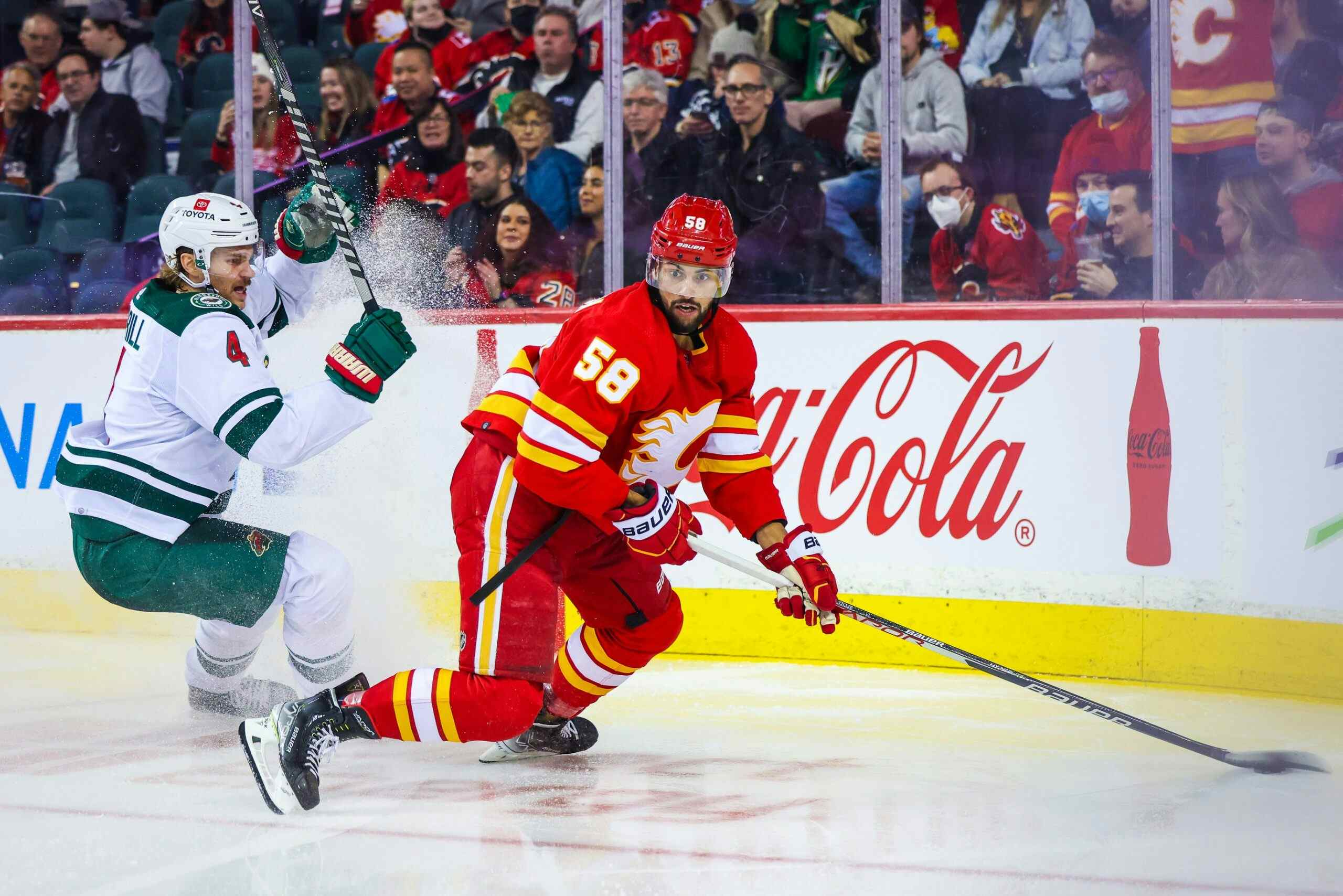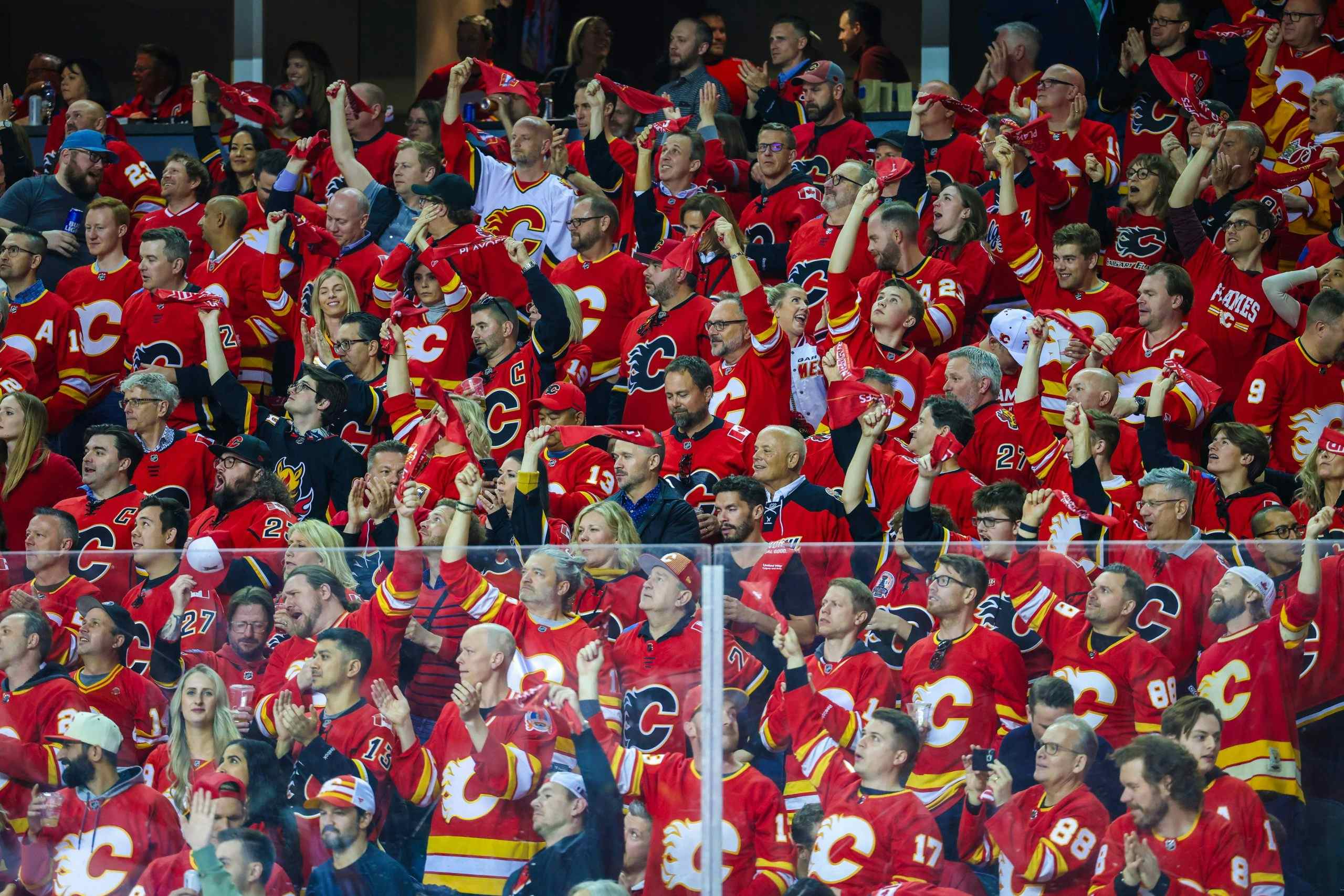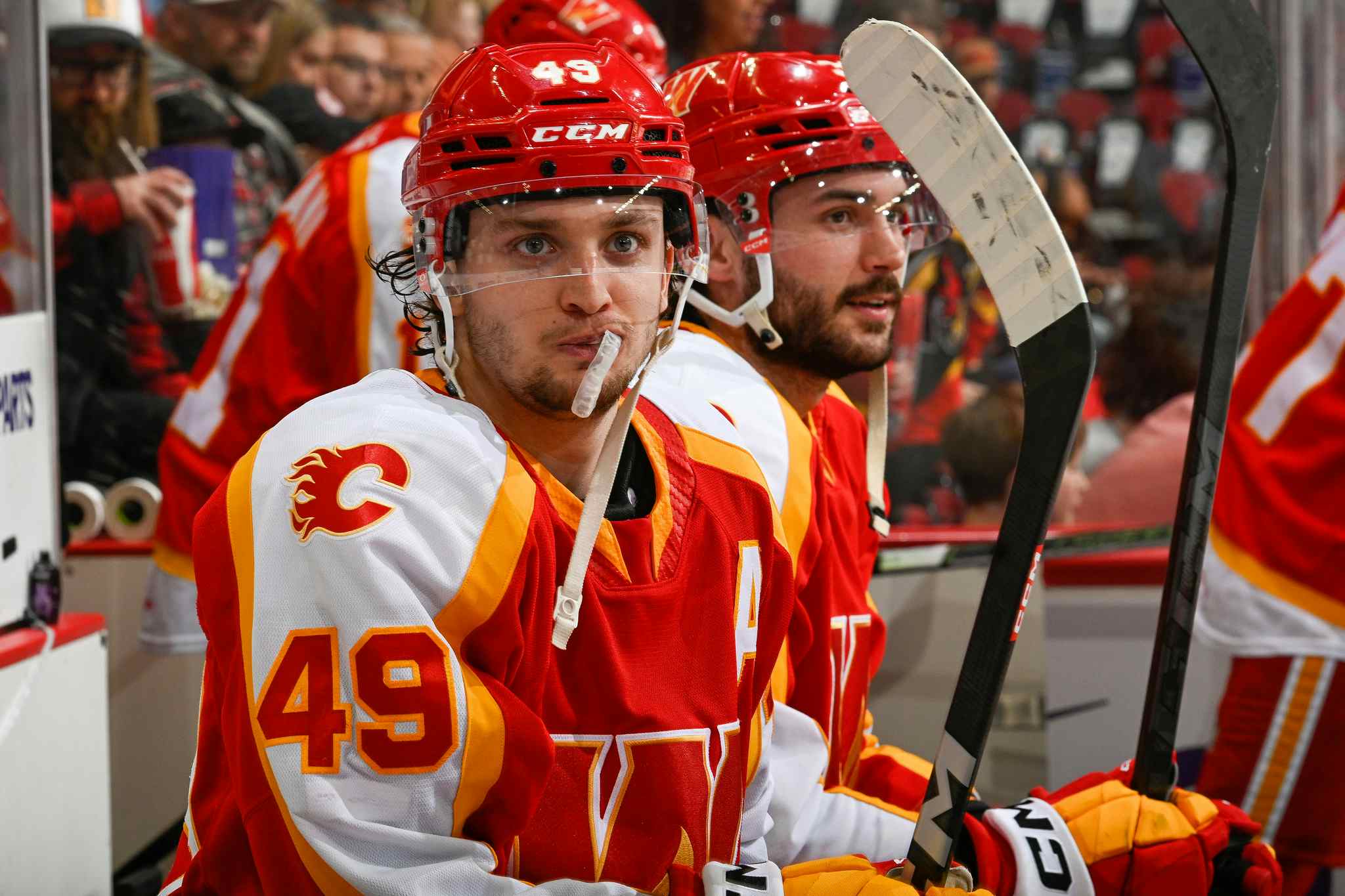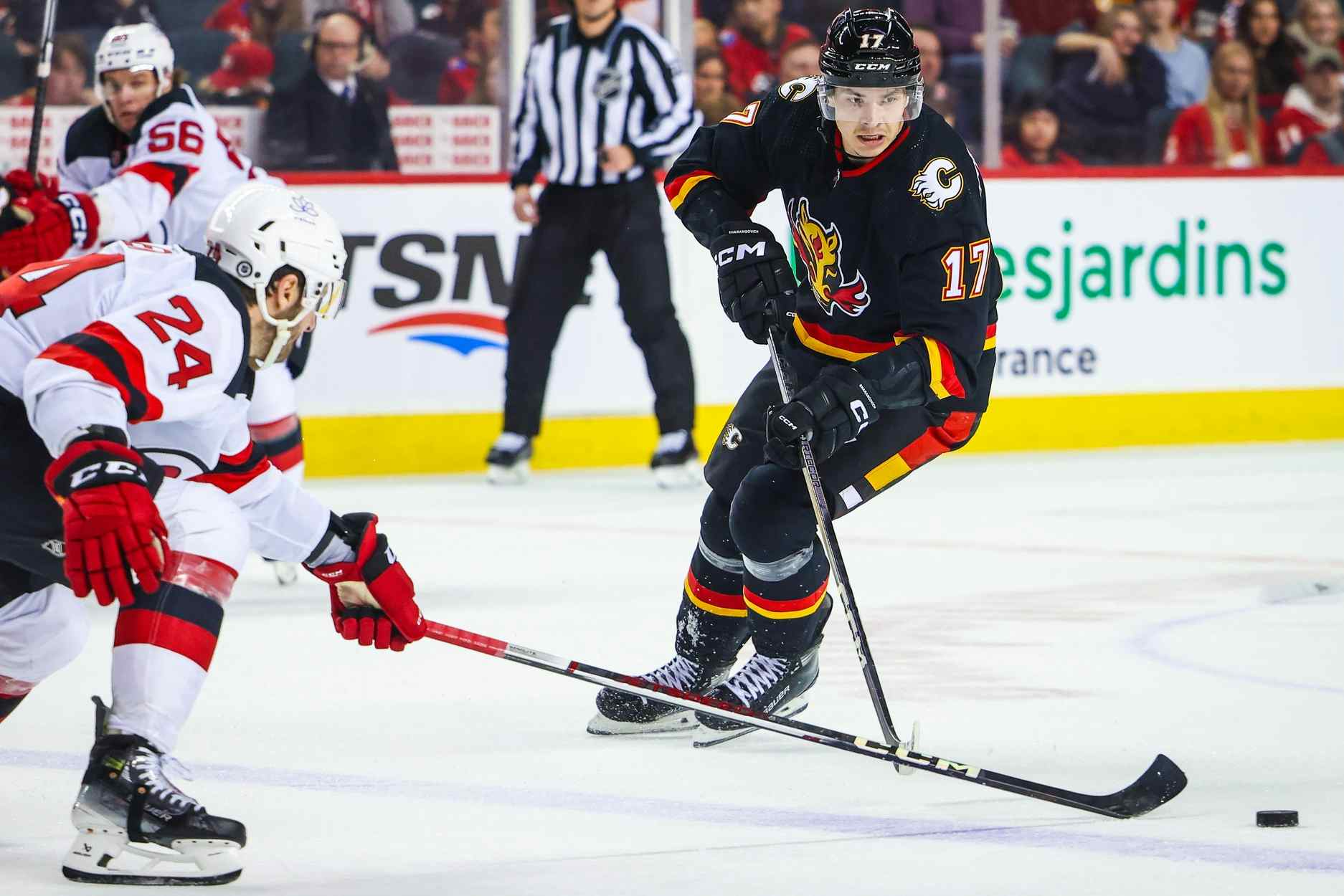Relive the 2001-02 Calgary Flames Season
By Ryan Pike
8 years agoAfter a whirlwind first season under new general manager Craig Button, the Calgary Flames hoped for some normalcy and stability in 2001-02. The 2000-01 campaign saw them switch head coaches and team captains mid-season, but with new coach Greg Gilbert under a long-term contract and new captain Dave Lowry returning to the fold, the thought was that the streaky nature of the previous team could be avoided.
The good news is that it worked, and the team wasn’t nearly as streaky. The bad news is that despite being much better in most ways, the 2001-02 Flames failed to make the post-season and finished a smidge below .500. The streak of playoff futility continued.
SEASON RESULTS
| Northwest Division | GP | W | L | T | OTL | Pts | GD | Sh%* | Sv%* | PDO* | Conf. Rank |
| y-Colorado | 82 | 45 | 28 | 8 | 1 | 99 | +43 | 9.4% | 92.2% | 101.6 | 2nd |
| x-Vancouver | 82 | 42 | 30 | 7 | 3 | 94 | +43 | 10.9% | 89.9% | 100.8 | 8th |
| Edmonton | 82 | 38 | 28 | 12 | 4 | 92 | +23 | 9.1% | 91.4% | 100.5 | 9th |
| Calgary | 82 | 32 | 35 | 12 | 3 | 79 | -19 | 9.1% | 90.2% | 99.3 | 11th |
| Minnesota | 82 | 26 | 35 | 12 | 9 | 73 | -43 | 10.0% | 89.6% | 99.6 | 12th |
*-Because the NHL didn’t have detailed stats breakdowns back then, we
used all-game numbers rather than the proper even-strength numbers to
approximate PDO and calculate shooting and save percentages.
used all-game numbers rather than the proper even-strength numbers to
approximate PDO and calculate shooting and save percentages.
SEASON RECAP
The 2001-02 season will probably be best remembered for two primary storylines:
- The emergence of Jarome Iginla as a consistent, difference-making, NHL power forward.
- The miraculous October start, Roman Turek’s contract extension, and the Flames collapsing in on themselves like a dying star immediately after he signed it.
Jarome Iginla emerged from his cocoon in 2001-02. At the ripe old age of 24, Iginla took the proverbial “next step,” scoring 51 goals, anchoring the Canadian Olympic team as it won its first gold medal in 50 years, and generally stepping up in every conceivable way. Iginla found chemistry with Craig Conroy and Dean McAmmond on the affectionately-named “MCI Line,” and the trio made headaches for opponents whenever they were on the ice.
The issue was that beyond that group, and a team-wide October hot streak, there wasn’t much to cheer about.
Goaltender Roman Turek, acquired at the 2001 Draft from the Blues for prospects and Fred Brathwaite, led the team on a white-hot 13-2-2-2 run. When he signed a three-year contract extension on November 19, the Flames were among the league’s best. Then they immediately began a horrendous string of games; going winless in seven (0-4-3), winning once in 11 (1-6-4) and needing until January 3 (22 games later) to win five games from when Turek signed. Good goaltending can cover up for a lot of things, and the Flames didn’t get a lot of it after the ink dried, so they remained a team with some deep flaws.
The team’s flickering playoff hopes were firmly extinguished with another woeful run late in the season which saw them go winless through eight games and dropped them from being a team teetering around the .500 mark to one firmly and sadly in the doldrums.
And as the team circled the drain, a slow-burning feud began between top centre Marc Savard and head coach Greg Gilbert. The manner in which Button dealt with that issue would define his tenure in Calgary.
SCORING LEADERS
| Player | GP | G | A | Pts | +/- |
| Jarome Iginla | 82 | 51 | 44 | 96 | +27 |
| Craig Conroy | 77 | 27 | 48 | 75 | +24 |
| Dean McAmmond | 73 | 21 | 30 | 51 | +2 |
| Derek Morris | 61 | 4 | 30 | 34 | -4 |
| Marc Savard | 56 | 14 | 19 | 33 | -18 |
| Toni Lydman | 79 | 6 | 22 | 28 | -8 |
| Igor Kravchuk | 78 | 4 | 22 | 26 | +3 |
| Rob Niedermayer | 57 | 6 | 14 | 20 | -15 |
| Clarke Wilm | 66 | 4 | 14 | 18 | -1 |
| Chris Clark | 64 | 10 | 7 | 17 | -12 |
Fun Fact: Jarome Iginla became the first Flames player to win the Art Ross Trophy as the NHL’s leading point-scorer and also won the Maurice “Rocket” Richard Trophy as the league’s top goal-scorer. He was narrowly edged out by Montreal’s Jose Theodore for the Hart Trophy as league MVP.
NOTABLE TRANSACTIONS
Just like the season prior, general manager Craig Button made tinker trades during the regular season and a lot of moves at the draft. Most of these moves were calculated gambles.
- December 18, 2001: traded Jeff Cowan and the rights to Kurtis Foster to Atlanta for Petr Buzek and a sixth round pick.
- March 17, 2002: traded Jukka Hentunen to Nashville for a conditional draft pick.
- March 19, 2002: traded Bob Corkum to Buffalo for a fifth round pick.
- March 19, 2002: traded Jamie Allison to Columbus for Blake Sloan.
- June 22, 2002: traded down (from 9th to 10th) with Florida, gaining back a fourth round pick.
- June 22, 2002: traded down in the third round with Toronto, gaining back a fifth round pick.
- June 22, 2002: traded a ninth round pick to Minnesota for Jamie McLennan.
- June 23, 2002: traded down in the fourth round with Montreal, gaining back a fifth round pick.
- June 30, 2002: traded a third round pick and a conditional pick to Toronto for the rights to pending unrestricted free agent Curtis Joseph.
The trade-down deals were a Button specialty, and gained him a lot of picks. He was also able to acquire a pretty solid back-up goalie in McLennan for basically nothing, and flipped a third round pick to Toronto to gain back a compensatory second round pick when Joseph didn’t sign with the Flames. Pretty astute moves, if you ask me.
In terms of free agency, Calgary remained rather chilly on that front: the summer of 2002 saw them acquire Bob Boughner as their lone “big fish” along with minnows such as Craig Berube, Scott Nichol, Jamie Wright, Alan Letang and Kay Whitmore. The team lost Phil Housley in the annual waiver draft and lost Rico Fata to in-season waivers, giving birth to a meme on the CalgaryPuck forum when multiple users kept making threads announcing Fata’s departure – a duplicate thread on that forum has forever since been known as a “Fata.”
Here’s the 2002 Draft class; Button’s scouts (led by new head amateur scout Mike Sands) brought in a dozen new bodies. Four of them turned out to have NHL careers of note to varying degrees.

Nystrom and Lombardi became reliable role players in the bigs. Van der Gulik has been a perpetual bubble player; reliable enough to play on a team’s bottom six, but not quite good enough to cement himself as an NHLer full-time. McElhinney found a niche for himself as a solid back-up netminder.
Beyond those guys, though, the vast majority of the drafted players failed to even become full-time professional hockey players in North America.
RETHINKING THE 2001-02 FLAMES
We don’t have the numbers to back up this claim, but I wouldn’t be shocked if the first 19 games of the 2001-02 season – featuring a 13-2-2-2 record – weren’t a product of a sky-high PDO. Five of their first 13 wins were eked out in one-goal games, and five wins came in games where they were significantly out-shot and Turek held them in – including a game that fit into both categories. Eventually they were bound to cool down and, voila, they were dealt a course correction in a brutal manner.
The team overall was not great defensively: they were in the bottom third in terms of goals against per game, were frequently out-shot, and were one of the league’s worst penalty-killing teams. That meant that they were very reliant on Turek stealing games for them and Iginla’s group amassing goals to keep them in contention. Both things happened in spurts throughout the season, but neither happened nearly enough for the team to have a real chance at making the post-season.
Recent articles from Ryan Pike





